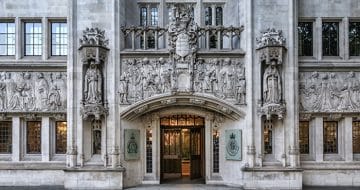Hearsay, TC applications, Donoghue v Stevenson and more

Lawyers, academics, and law students have been testing out ChatGPT, so we put ourselves up to the challenge to quiz the AI robot everyone is talking about with some questions of our own.
Open AI’s language-generating system has come a long way in the past two years. Back in August 2020, it was criticised for being unable to adequately place things in context which led to nonsensical responses, including one where it suggested that wearing a bathing suit was a suitable alternative to a suit for a lawyer attending court.
As a humble starter for ten, we wanted to see if the AI system was aware of a case that is quintessential to UK law students’ legal education: Donoghue v Stevenson.
We asked, ‘Explain who is it I can sue if I find a snail in my ginger beer bottle under English law’ and got a neat paragraph in response which you can see below. But, as is common practice when giving advice, cases were not explicitly referred to, so Donoghue v Stevenson sadly did not get a shout out.
Been asking the questions that matter to ChatGPT to test its legal acumen, law firm application skills, and it’s opinion of City law firms!
1) Donoghue v Stevenson 🐌 pic.twitter.com/6gX0j15LFW
— Will Holmes (@wsgholmes99) December 5, 2022
Next, we asked it the classic application question ‘Why do you want to be a commercial lawyer?’.
2) Why do you want to be a commercial lawyer? pic.twitter.com/4Aw2woKDMT
— Will Holmes (@wsgholmes99) December 5, 2022
The AI bot also provided an excellent summary of the exceptions to the hearsay rule.
3) What are the exceptions to the hearsay rule? pic.twitter.com/U8eHr9IkQS
— Will Holmes (@wsgholmes99) December 5, 2022
We also asked ‘Which is the best law firm in the UK?’. This prompted a disappointingly vague response.
4) Which is the best law firm in the UK? pic.twitter.com/g4M3tZ6egc
— Will Holmes (@wsgholmes99) December 5, 2022
As well as answer questions, AI systems such as ChatGTP are also capable of producing documents, paraphrasing them and producing informative summaries — something that has not gone down all too well with lawyers.
Ok, so we need, the name of the person who invented this, a time machine, and Linda Hamilton's phone number.
— Coach House Chambers (@HouseChambers) December 5, 2022
I’m not a lawyer so me being able to copy a lease into ChatGPT and then asking it to explain it to me like I’m in 6th grade is a huge tool for normal people. pic.twitter.com/L6Vd6XTDIf
— Sean (@lostmyshoes01) December 4, 2022
It has also raised questions about how the tool might be used by students when writing essays and even teachers marking assignments!
The education of the future: teachers and students throwing AI at each other. https://t.co/TnQUk7KKKw
— Andres Guadamuz (@technollama) December 4, 2022
Have been playing around with ChatGPT and my impression is take-home/online exams are essentially dead in many subjects – incl most law undergrad subjects. It doesn’t produce great answers of course, but if you need a “pass”, it’ll suffice and much better w/ a little editing.
— 𝖤𝖽𝗆𝗎𝗇𝖽 𝖲𝖼𝗁𝗎𝗌𝗍𝖾𝗋 🇺🇦 (@Edmund_Schuster) December 5, 2022
You can try the AI bot for yourself here.



